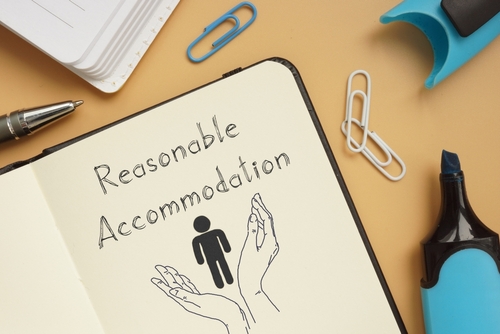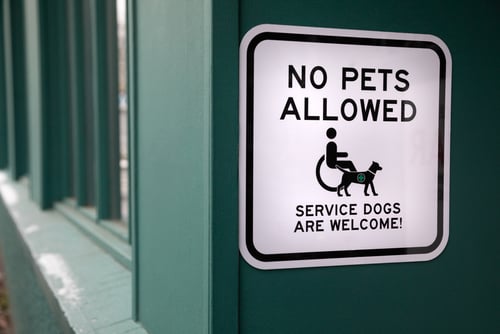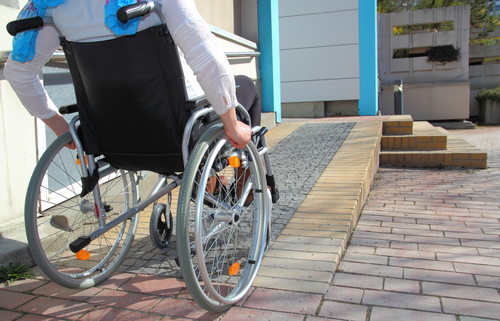Owning rental properties comes with many responsibilities, including legal obligations and compliance. One crucial topic for all landlords to become familiar with is reasonable accommodation requests. For individuals with disabilities, it may be necessary to make reasonable accommodations for them to live in your rental. If you’re unfamiliar with reasonable accommodations or want to learn more about landlord responsibilities, just keep reading.

Contents of This Article:
- What are Reasonable Accommodation Requests?
- Who Qualifies for Reasonable Accommodations?
- Landlord Obligations for Reasonable Accommodation Requests
- Reasonable Accommodations vs. Modifications
- Ensure Compliance With Property Management
What are Reasonable Accommodation Requests?
Whether you’re a landlord, tenant, or property manager in Northern Virginia, staying up-to-date with landlord-tenant laws is important. One crucial topic to pay attention to is Fair Housing Laws and reasonable accommodations requests.
A reasonable accommodation is a change or exception to housing rules, policies, or regulations to help a resident or applicant with disabilities take advantage of a service or dwelling. Under Fair Housing Laws, landlords must make reasonable accommodations for tenants with disabilities to give them an equal opportunity to enjoy a rental home.
It must be practical and feasible to qualify as a “reasonable” accommodation. As such, landlords cannot deny reasonable accommodation requests unless they’re unreasonable or cause a significant burden. Next, we’ll review some examples of reasonable accommodations in rental homes.
Examples of Reasonable Accommodations

Reasonable accommodations include any changes in the rules or policies to make it easier for a person with disabilities to live in the unit. Some examples may include, but are not limited to:
- Changing the way you communicate with tenants, like increasing the font size on documents or sending extra reminders to a tenant that needs them
- Allowing a tenant to transfer to a ground floor unit for easy access
- Providing a handicapped or designated parking space near a door for tenants with disabilities
- Allowing and waiving pet fees for a service animal or emotional support animal to live in a unit that does not allow pets
- Permitting a personal care attendant or live-in aid for residents with disabilities and waiving the rules or fees associated with guests
Who Qualifies for Reasonable Accommodations?
To qualify for reasonable accommodation, a tenant must have a disability defined under fair housing laws. The Fair Housing Act defines a person with a disability as someone with a physical or mental impairment that limits one or more major life activities. Individuals with a record of an impairment or those regarded as having an impairment also fall under the definition.
Physical or mental impairments may include but are not limited to diseases and conditions such as:
- Orthopedic, visual, speech, or hearing impairments
- Cerebral palsy, autism, or other intellectual disabilities
- Mental or emotional illnesses
- Epilepsy, muscular dystrophy, or multiple sclerosis
- Cancer, heart disease, diabetes, and immunodeficiency infections
When a tenant meets the definition of a disability, landlords, and housing providers are required by law to keep all information confidential.
If tenants do not meet the criteria listed above, they may not request a reasonable accommodation or modification under Fair Housing laws. However, if a non-disabled tenant needs a modification, they can request it with the landlord or property manager.

Verification and Documentation
When a disability isn’t visible or apparent, a landlord or property manager can request verification that the person meets the definition of a disability. Generally, tenants or applicants can prove a disability through proof of benefits or a medical professional’s signed statement.
A letter to a housing provider from a medical professional should indicate if the tenant or applicant has a disability as defined by Fair Housing Laws. Additionally, they can give their professional opinion on whether an individual needs a reasonable accommodation or modification to have an equal housing opportunity.
If you receive a letter from a healthcare provider regarding a tenant or applicant, keeping the documentation for your records is important.
Landlord Obligations for Reasonable Accommodation Requests
Federal nondiscrimination laws under the Fair Housing Act prevent landlords from denying reasonable accommodation requests for qualified individuals. That said, these laws cover tenants and home seekers with disabilities. Additionally, the laws also cover those who live or are associated with individuals with disabilities. Therefore, housing providers may not refuse residency to individuals with disabilities or place conditions on their residence because of their disability.
Every individual, corporation, or association involved in housing or residential lending must comply with reasonable accommodation requests and Fair Housing Laws. For instance, all property owners, managers, homeowners, lenders, real estate agents, and brokerage services must comply.
The only instance when a housing provider may deny a reasonable accommodation or modification request is if the person does not have a disability. However, if there is no disability-related need for a modification or the request is unreasonable, it may also be denied by a housing provider.
Reasonable Accommodations vs. Modifications
Reasonable accommodations and reasonable modifications have a few key differences. For instance, accommodation is an exception or change to rules, policies, or procedures. On the other hand, a reasonable modification is a structural or physical change to a property that allows a tenant to overcome obstacles that interfere with their use of the unit.

Tenants may request a modification if structural changes to a property will give them an equal opportunity to live there. For instance, some examples of modifications include:
- Installing a ramp for an individual with a wheelchair in a unit where there are only stairs
- Modifying door knobs for someone with mobility impairments
- Adding a grab bar to a tenant’s bathroom
- Altering a residence, like widening a door, so it’s accessible for an individual in a wheelchair
Who Pays for a Modification?
For private rental units, landlords or housing providers may require the tenant to pay for the cost of the modification. Additionally, they may request that funds be set aside to restore the property to its original condition when the tenant moves out. If a licensed contractor needs to modify, a housing provider may request that the tenant pays for it.
A housing provider may pay for the modification if they’re willing to do so or want the change to stay after the resident leaves. On the other hand, in government housing, landlords or housing providers generally pay for modifications unless it’s unreasonable or a financial burden.
Ensure Compliance With Property Management
Rental property owners have a significant responsibility to comply with reasonable accommodation requests. If not, you could be subject to legal consequences. One of the best ways to ensure compliance throughout all your rental properties is with comprehensive property management. With a solid property management team on your side, you don’t have to worry about whether your rentals are legally compliant or not.
Need More Advice? contact us today!
Bay Property Management Group is well-versed in landlord-tenant laws, so look to us for top-notch comprehensive rental management services. We manage rentals in various locations, including Baltimore, Philadelphia, Northern Virginia, and Washington, DC. Contact us today to learn more about our management services and how we can help your business succeed.
